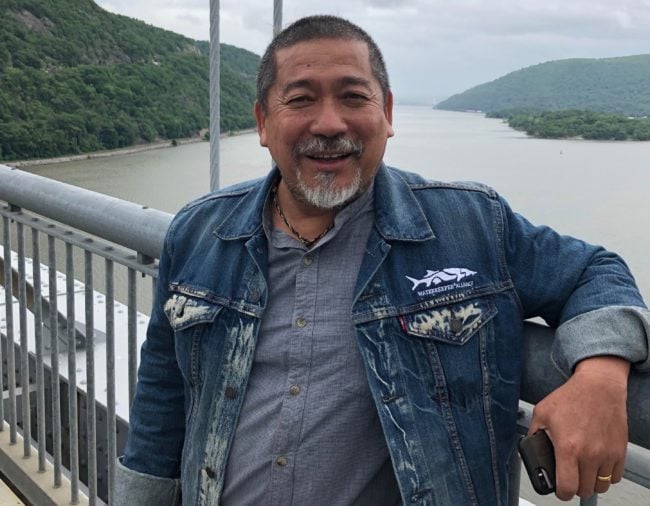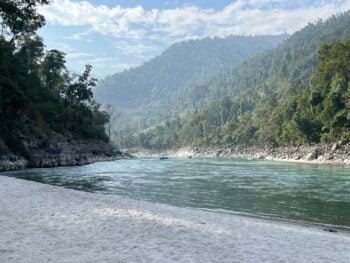Who Is Waterkeeper: Megh Ale, Karnali River Waterkeeper
By: Thomas Hynes

Megh Ale first saw the Karnali River in 1991. He hiked a full two days to get there, and it was well worth the effort. The waters were turquoise blue and surrounded by fully intact forests. The river was also home to several indigenous cultures. Megh had never seen anything like the Karnali before. It was both visually stunning and culturally significant. It was also free of dams. Megh knew then and there that he had to protect this special waterway.
“The culture, the white water, the beautiful beaches, all those red rock canyons. It was an amazing combination of nature and culture,” says Megh. “After exploring the whole river, I thought this is so pristine.”
After a few return trips to the river, Megh decided to take action. In 1995, he founded the Nepal Rivers Conservation Trust (NRCT) with his like-minded river guide friends. The goal was to restore, conserve, and protect Nepal’s rivers through affirmative action and education, while maintaining the cultural integrity of local riverside communities. In this capacity, Megh has taken policymakers, journalists, students, and other stakeholders to the river. In 2015, Megh officially became the Karnali River Waterkeeper.
“We must educate our politicians on the value of nature,” says Megh. “Ideally, we would get the Karnali a ‘River and Heritage’ designation.”

The Karnali River, considered one of the top-five rafting destinations in the world, is incredibly biodiverse. There are more than 800 bird species, 130 fish species, and iconic wildlife like rhinoceroses, tigers, snow leopards, Gangetic dolphins, blue sheep, and wolves. The area sits at the intersection of the Tibetan Plateau, the Ganges River, and the Himalayas, resulting in an abundance of flora and fauna. Additionally, the Karnali is the last remaining free-flowing river in Nepal, as it remains untouched by dams.
However, this pristine status is under threat. Plans are underway to construct three hydropower facilities on the Karnali River, despite Nepal’s existing hydropower plants already meeting its energy needs. These projects are profit-driven and ignore the potential of alternative energy sources like solar and wind, both of which are viable given Nepal’s sunny climate and high altitudes.
Megh is not against hydropower but suggests developing tributaries before touching the main river. For the Karnali itself, he envisions a sustainable, eco-tourism-based business model. This includes the Rakam Karnali Centre for Eco-Tourism, where visitors can learn about the region’s unique natural beauty.
The Great Karnali Quest
To draw global attention to the Karnali, Megh has proposed a major biennial event: The Great Karnali Quest. This would be the longest rafting race in the world, spanning 248 kilometers, and would attract rafting teams from across the globe. World-class athletes and media would gather to experience the river’s beauty, raising its profile internationally and promoting eco-tourism. Teams would race through breathtaking scenery and camp at culturally significant locations.
“The idea was how to bring the world to the Karnali River, to get it on the map, and have that attention,” says Megh. “We want journalists to follow the world-class athletes and showcase the Karnali region as a preeminent eco-tourism destination.”
Charity Expeditions on the Karnali
In addition to the race, NRCT plans to organize charity expeditions twice a year. These 12-day trips on the Karnali River will occur in November and March, giving participants a chance to explore this spectacular river while contributing to conservation efforts. Funds raised from these expeditions will help support projects to protect the Karnali.
Conservation Through Collaboration
Megh’s efforts have also been highlighted in the documentary film Sister River. In this film, Hudson Riverkeeper Tracy Brown visits Megh to draw parallels between conservation efforts in Nepal and New York. “My message to them was a cautionary tale,” says Tracy in the film. “Don’t treat your river the way we treated ours. Protecting what you have is easier and more affordable than to dam it, pollute it, and then do the recovery work.”
Megh views his work not just as a conservation mission but as a legacy for future generations. He often recites his mantra: “Om Kaylass Karnali Karma,” which translates to, “Let it flow free for the karma of our future generations.”